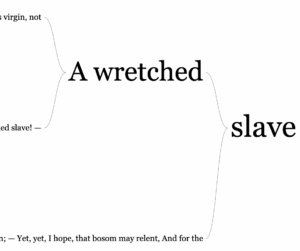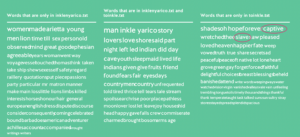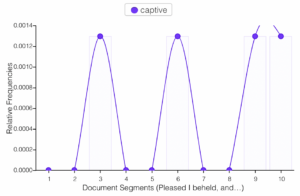The Question
The general story of “Inkle and Yarico” is that in hiding from other Native Americans, Inkle encounters Yarico, a Native American woman that he immediately falls in love with. Eventually, however, when they leave their cave, he sells her into slavery. This version of the story, entitled “Yarico to Inkle,” is a nostalgic and pleading poem in which Yarico looks back on their love and pleads with Inkle to set her free. There is much more apparent empathy for Yarico in this version than some of the earlier ones, and her enslavement is a much larger part of this text.
The combination of empathy towards Yarico and the continued description of her enslavement prompted me to consider whether this could be considered an anti-slavery text, or a text in support of abolition. In other words, does the word choice about slavery and the surrounding language indicate that this is an anti-slavery document?
The History
First I wanted to do some background research to determine how likely it would be for an anti-slavery poem to be published in 1792 in a Philalphia-based subscription magazine. How strong was public sentiment against slavery? As it turns out, there was growing opposition well before the 1790s, especially in Pennsylvania. As early as the 1600s, the Quaker population of the state began to criticize slavery and work to end it amongst their group. The Pennsylvania Society for Promoting the Abolition of Slavery was originally founded in Philadelphia in 1775 and several figures in the North, including Benjamin Franklin, began advocating publicly for abolition prior to 1792. Most importantly, the Abolition Society of Pennsylvania pushed the state to pass an abolition bill in 1780.
With this basic research in mind, it can be inferred that public sentiment towards abolition in Pennsylvania, where likely most of the readers of this text were, was probably positive. They’d certainly be receptive to a sympathetic poem like this.
The Analysis
First, I put the text through the word counter to determine which words and phrases dominated. Both “slave” and “captive” were among the most commonly used words, an indication of how important that part of the story is. I find it interesting that “captive” is used more often than “slave,” because to me, “captive” feels like a much more sympathetic word to use. In the general public, “slave” was likely the most common, if not essentially the only, word used, and even though we think of “slave” as a highly negative word, “captive” is possibly more obviously negative for the time. It clearly illustrates that Yarico was captured and is there against her will.

“Hope” and “love” were also some of the more commonly used words in the text. “Hope,” similar to “captive,” shows Yarico’s desire to be free. Both words attach a lot of emotion to her, which is different from some other versions that describe the story with less feeling. The emotion could serve to further humanize Yarico. Other common words like “happier,” “sad,” and “fears” could provide the same purpose.
Something that potentially detracts from the abolitionist possibilities of the text is that “Indian” is also a commonly used word throughout the poem, definitely indicating that Yarico is considered Native American in this text, though enslaved people were most commonly thought to be African.

We can take a closer look at some of the word choice using the Word Tree, particularly the slavery-related words. The most notable discovery was that two out of three of the uses of “slave” was actually “wretched slave,” which I think encourages even more empathy for Yarico. She’s not just a slave, she’s wretched and miserable. I also wanted to take a look at the word “free,” which was surprisingly only used once, though the whole line is “Will no pitying mortal set me free?” which perhaps does prompt pity from the reader.

Next, I wanted to compare the usage of slavery-related language between this text and the Richard Steele version with the SameDiff tool to see if this one seemed more anti-slavery. These results were perhaps most telling; the words “captive” and “slave” appear only in Yarico’s poem to Inkle, not at all in the Steele account. In comparing this poem with the original Richard Ligon version, we find that “slave” does appear in both, but it’s only once at the end of the Ligon version.

Lastly, I took a quick look at the text through the Voyant Tool, which provided an interesting finding for when the word “captive” is used throughout the poem. This word, used four times, is used pretty consistently, appearing once approximately every fourth of the text. Meanwhile, two of the three appearances of “slave” appear in the same line (and it’s to say “wretched slave”). To me, this indicates that “captive” is the more predominant word, and again, this word might suggest more empathy.
The Results
Overall, while this poem is certainly empathetic towards Yarico and enslaved people, I would say that there’s probably not enough evidence to indicate that its purpose is to be abolitionist, or even anti-slavery, though that might be how it comes across. I think it’s more likely that the publisher wanted to produce a particularly gut-wrenching version of an already popular story because they figured that would be pretty well-received amongst their readers. Given that the area was already seemingly anti-slavery, this probably didn’t serve to push that agenda; the magazine probably didn’t circulate as far as states where slavery was still most prominent. However, I would, again, say that the language is without a doubt sympathetic to enslaved people.
The Metadata
- Perspective: Yarico
- Publication year: 1792
- Publication format: magazine
- Publication location: Philadelphia
- Yarico’s ethnicity: Native American
- Genre: poem
Bonus: I was considering why “Inkle” is commonly used in the text even though it is meant to be a direct address to him (usually, it was “you” or “thee”). My interpretation is two possibilities: 1. We use someone’s name more often when we really like them. This is actually something I’ve heard before and something I’ve noticed in myself. 2. This is more of a guess, but we might use someone’s name more when we want something from them, as Yarico does from Inkle. This isn’t related to my research question but I thought it was interesting and wanted to mention it.